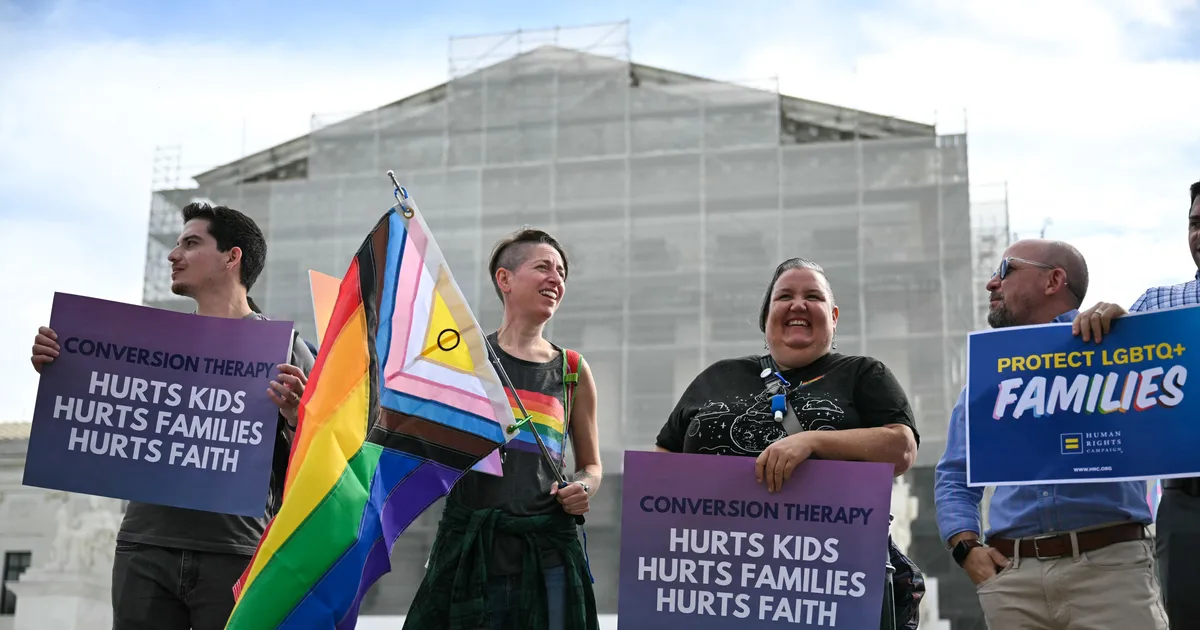
LOADINGERROR LOADING
The Supreme Court’s conservative majority seemed poised on Tuesday to accept a conservative Christian group’s free speech challenge to a Colorado law banning conversion therapy, in a case that could have sweeping implications for LGBTQ+ youth and health care across the country.
The case, known as Chiles v. Salazar, was brought to the court by the Alliance Defending Freedom on behalf of petitioner Kaley Chiles, a Christian licensed therapist in Colorado Springs who claims that the state’s 2019 law banning conversion therapy silences her speech.
Advertisement
At the heart of the case is the question of whether talk therapy, that is, speech uttered by a licensed mental health provider with a client, is protected by the First Amendment — even if it goes against a state’s law banning conversion therapy for queer and trans youth.
Over and over again, the conservative justices seemed to signal that they believe Colorado’s law is unconstitutionally trying to curb speech in a way that favors one viewpoint over another.
Justice Samuel Alito gave a hypothetical example of an adolescent boy asking for a therapist’s help to “end or lessen” his feeling of same-sex attraction versus asking a therapist to help him feel comfortable as a gay man. Because Alito said Colorado’s law would prohibit therapists from questioning the hypothetical boy’s sexuality, it “looks like blatant viewpoint discrimination.”
Advertisement
In another moment, Justice Neil Gorsuch asked whether a ruling against Colorado would therefore limit a conservative state from passing a “mirror-image” law that bans therapy that affirms and encourages youth to accept their gender identity or sexual orientation.
Justice Amy Coney Barrett asked, “Let’s say you have some medical experts that think gender-affirming care is dangerous to children and some that this kind of conversion talk therapy is dangerous. Can a state pick a side?”
Hashim Mooppan, a Department of Justice lawyer supporting the ADF’s challenge, said that the First Amendment would block either type of law and that another state could have banned gender-affirming talk therapy under that same logic.
Advertisement
“In fact, we think that’s a strong reason in support of our position,” he said.
In the United States’ brief in support of Chiles, Mooppan cites the 409-page report from the Department of Health and Human Services released earlier this year that called more research on “psychotherapeutic approaches” and “noninvasive alternatives” for treating gender dysphoria in youth, as opposed to existing treatments like puberty-blockers, hormone therapy, and regular therapy that are supported by major medical associations.
The court’s recent ruling in United States v. Skrmetti earlier this year, which allowed Tennessee’s ban on gender-affirming care for minors to go into effect, also came up. In Skrmetti, Chief Justice John Roberts, writing for the majority, concluded that questions regarding the regulation of treatments like puberty blockers and hormone therapy for youth be left “to the people, their elected representative, and the democratic process.”
So, why not the same with laws governing the licensing of mental health providers, the liberal justices asked now?
Advertisement
“I’m wondering why this regulation at issue here isn’t just the functional equivalent of Skrmetti?” Justice Ketanji Brown Jackson asked James Campbell, an Alliance Defending Freedom attorney arguing in support of Chiles. “It seems odd to me that we might have a different result here.”
Colorado’s law prohibits licensed providers from practicing conversion therapy in a way “that attempts or purports to change an individual’s sexual orientation or gender identity.” The law does exempt unlicensed religious counselors. In the 1970s, conversion therapy included aversive practices like shock therapy, though today, it mostly involves talk therapy, often with religious therapists.
Lawyers for Chiles and the U.S. government repeatedly tried to draw a line between medical conduct and speech, the former of which they said could be regulated, while the latter was subject to First Amendment protections.
Advertisement
“If we were in the medical context and there was something like administering drugs, performing procedures, conducting examinations, that would take it outside of the arguments we’re making,” said Campbell, arguing that the court should consider each separately. “The state of Colorado recognizes that there’s a very big difference because it treats psychiatrists under Section 240 of the code and it treats counselors under 245, and that’s a recognition that it’s just different regulations.”
In response to a question from Justice Jackson, he said that therapy was not categorized the same as medical treatment.
“I don’t believe that we are categorizing it that way, but I don’t think it matters because the First Amendment depends on the difference between speech and conduct,” he added.
Advertisement
Shannon Stevenson, the Colorado solicitor general representing the state, argued that there was little daylight between the two when it came to mental health counseling.
“The state cannot lose its power to regulate the very professionals that it licenses just because they are using words. A health care provider cannot be free to violate the standard of care just because they are using words, and a state cannot be required to let its vulnerable young people waste their time and money on an ineffective, harmful treatment just because that treatment is delivered through words,” she said during her opening statement.
If the court rules against Colorado, it could imperil similar laws in 23 states and Washington, D.C., and raise broader questions about the regulation of health care.
Advertisement
There is no evidence to suggest that conversion therapy has ever been successful in changing a person’s gender identity or sexual orientation. There is, however, a robust body of research demonstrating the higher rates of suicidality, depression and anxiety among the LGBTQ+ youth and adults alike who have been subjected to these practices.
By contrast, the evidence presented by the ADF to support the use of conversion practices was shoddy. Two of the scholars quoted said the ADF “profoundly” misrepresented their research that illustrated the damage of conversion therapy, the Guardian found. The group also cited an anonymous Reddit post from someone who said they regretted their gender transition. The ADF has a history of being heavily involved with the business efforts and public image of its clients, as part of its larger goal of overturning discrimination laws based on sexual orientation and gender.
Yet during the oral arguments, the ADF’s lack of evidence in support of conversion therapy did not stop the court’s 6-3 conservative majority from questioning current expert medical consensus.
Advertisement
At one point, Alito questioned Stevenson on whether there were times when “medical consensus has been politicized and taken over by ideology” as a way to address whether the court could, or should, rely on the medical consensus regarding the standard of care. He referenced the Supreme Court’s notorious 1927 opinion in Buck v. Bell, which allowed for the involuntary sterilization of “feeble-minded” individuals in Virginia, as an example of how medical professionals have been wrong before, and could err again.
Mooppan asked the court to void the 10th Circuit Court of Appeals’ 2024 decision, which found that Chiles had failed to demonstrate how the Colorado ban had violated her fundamental rights, and send the case back down to the lower court.
KeepOur VoiceStrong
Your SupportFuelsOur Mission
Your SupportFuelsOur Mission
Stand With Free Press
The need for a free and fearless press has never been greater. As corporate media cave to this administration’s pressure, we remain steadfast in our commitment to remain free and fair. Become a member today.
We remain committed to providing you with the unflinching, fact-based journalism everyone deserves.
Thank you again for your support along the way. We’re truly grateful for readers like you! Your initial support helped get us here and bolstered our newsroom, which kept us strong during uncertain times. Now as we continue, we need your help more than ever. We hope you will join us once again.
We remain committed to providing you with the unflinching, fact-based journalism everyone deserves.
Thank you again for your support along the way. We’re truly grateful for readers like you! Your initial support helped get us here and bolstered our newsroom, which kept us strong during uncertain times. Now as we continue, we need your help more than ever. We hope you will join us once again.
Support HuffPost
Already contributed? Log in to hide these messages.



